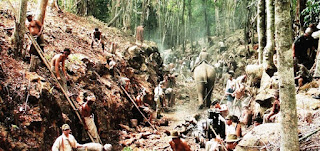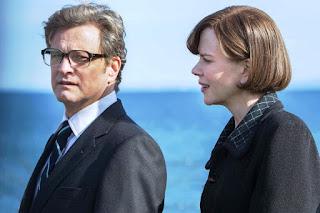"His whole life has been trains."




One film riding on the rails and under the radar of cinematic war films exploring the traumatic effects of war on the soldier is director Jonathan Teplitzky's The Railway Man (2013).
The story, co-written by Frank Cottrell Boyce, the man behind the gorgeous and understated science fiction love story by Michael Winterbottom, Code 46 (2003), examines the impact of war on a British officer held captive and tortured by the Japanese in Singapore during World War II after its fall in 1942.

The tale is told in flashback. To some it may seem distracting. Viewers glimpse the actual events of the soldier's internment and the physical and psychological impact of that war on the soldier. The Railway Man is and examines British officer Eric Lomax, played by Colin Firth. The film witnesses wearying psychological impact of war.
The film also delves into the impact of the war on a Japanese officer of the secret police (kempeitai), Takashi Nagase, played by the always strong and underrated Hiroyuki Sanada (Sunshine, Helix).

Firth always brings his English pomp, measured sophistication and ultimately restrained Brit to the proceedings, but it's never too much here. Understanding by many that Firth is considered one of the greatest actors to have graced the planet, Tom Ford's A Single Man (2009) still bored me to no end. This writer has often wondered about all the fuss, but The Railway Man made me a bit of a believer. Firth is a splendid performer and he's quite exceptional here as a tortured, conflicted man.
The film takes us on a character journey eschewing action for drama. The film works as part character mystery and potential revenge tale over gripping war action film a la Hacksaw Ridge (2016). And of course that's not the point of the picture regarding the latter. This film delves into the effects of war on man. How far can he be pushed before breaking? If not broken, how long before a man dies, figuratively, and stops living? These questions are embodied in the experience and life of Lomax.

Additionally, as suggested by the title, trains are a constant in the life of Lomax forever influencing the man and a part of who he is. Working in internment on the Burma-Siam "Death Railway" directly speaks to who Lomax was as a man and how trains have been part of his life even opening the film on a train. It's a wonder how he could love trains so much after such horror, but it's clear that trains course through his very blood and experience. We can't deny the things we are or love or form us.
The Railway Man has a languid, sometimes laborious pace, but the performances by Firth, Sanada, Jeremy Irvine, the delightful Nicole Kidman and the equally tormented Stellan Skarsgard keep the material chugging along and the viewer engaged.

The Railway Man has many strengths and builds to a profoundly moving conclusion. Experience this train ride to fully appreciate it.
So when it comes to the recurring themes of war one thing The Railway Man reminds us of so beautifully, poetically and eloquently through cinema is that human suffering following war endures. The psychologically scarring as human beings knows no sovereign borders or whether the recipient of war crimes themselves or even those who exacted such crimes. The suffering for some is indeed real. The Railway Man is based on a true story but even if it wasn't its message is true.

But further on, while The Railway Man moves at a slower pace than some war films, it digs deep into the hearts and souls of men in war. By films end, the caboose, it all comes together. Prepare yourself for a profoundly emotional experience and moving conclusion to the story that makes every minute of the film worth those final minutes. The Railway Man moved me physically to real emotion and while some may call me a softy that's not easy to do. Yoda once declared suffering leads to hatred and The Railway Man teaches us there is a path to forgiveness and bridging that divide through compassion may be what is required to live and love again.
Films like Wolfgang Petersen's Das Boot (1981), or the Clint Eastwood double bill Flags Of Our Fathers (2006) and Letters From Iwo Jima (2006) offer us and show us another perspective, another vantage point, of war, of country, of people and The Railway Man shows us something else about ourselves and another side of the man. That's a rare thing in cinema and The Railway Man delivers just that and takes its place alongside such powerful films.

The Railway Man.
Writer: Frank Bottrell Boyce/ Andy Paterson.
Director: Jonathan Teplitzky.

The War: World War II (1939-1945).

Notable dialogue:
"I'm a railway enthusiast. I like trains. I really like trains."
"You showed me nothing is worth more than this life."
"While I cannot forget .... I assure you of my total forgiveness. Sometime the hating has to stop."

What The Critics Had To Say:
Rotten Tomatoes assigned a 67% tomato to the film. One critic, Wesley Morris, stated the film doesn't "have the nerve for a serious consideration of trauma, vengeance, and forgiveness."
Ebert.com ranked the film 2 1/2 stars (of 4) while Christy Lemire noted the film offered a "tastefully safe treatment of a horrific subject."
Blu-Ray.com awarded the film its highest recommendation dubbing it "one of the most rewarding cinema experiences.... ... featuring a once-in-a-lifetime performance by Colin Firth" adding the film is "frequently difficult to watch" also calling it "the sort of movie that movies were made for."
The War Film Blog: Recommended as an emotional experience. And the conclusion of this film makes the ride on this train well worth the trip.

What Drew Me To The Film:
Stellan Skarsgard. His involvement caught my eye. I have something of a Stellan obsession quite frankly. It was Skarsgard coupled with the fact this writer had no idea about The Railway Man as a war film. The two factors sealed the deal for me.
The breadth and scope of Skarsgard's work is vast. David Fincher's The Girl With The Dragon Tattoo (2011) or In Order Of Disappearance (2014) and King Of Devil's Island (2010) are all films that deserve your attention, but most important is recent real star vehicle mini-series River (2015). River is conceivably one of my personally favorite criminal justice stories I've seen in recent memory and Skargard's performance here is a tour de force. It is an entirely unpredictable short series with true emotional power. As of this writing the series was available on Netflix. I've since purchased a region free Blu-Ray for the collection. One day I will return to it.

Skarsgard has a small role here in The Railway Man. Kidman too never disappoints. Sanada was quite simply a huge bonus. All combine for a meticulously performed film.
So it wasn't about trains for me. I'm not a train enthusiast.
Quite surprisingly though, The Railway Man ultimately moved this writer to a tearful lump. I was holding the tears back and choked up and it's a rare feat for any film to have that kind of impact on me. After seeing this stirring film it stays with you.

It's understandable the film received mixed reviews. It's approach to the subject is unique and is not without its problems regarding dramatization. Still, it manages to pull off its story and the desired effect of a final act with real power.
Judging by the reviews, writers and critics were generally split or torn on The Railway Man as much as the film is a contrast and juxtaposition of peace and war, joy and sadness, picturesque beauty against the violence and brutality of war internment and coping with the past or letting go. These dichotomies are embodied in the Lomax character rather poetically dispersed by Firth. Personally, this writer was inclined to embrace what was on offer in The Railway Man experience and largely appreciated its emotional journey that appears to have been lost or underappreciated by a good many.
IMAGE SPOILERS AHEAD!











































No comments:
Post a Comment